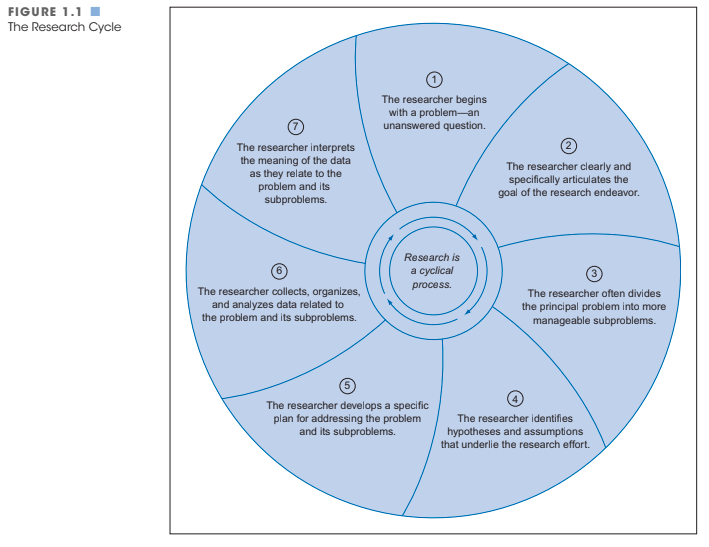INF447 Modules 1-5

- Key words: Research is critical, creative, formal/systematic/scientific/pure/rigorous, applied, experimental/theoretical, investigating, understanding, interpreting, analysing, confirming/refuting, communicating and cyclical (Leedy & Ormrod, 2015):

(The Research Cycle by Leedy & Ormrod 2015, p. 21). - Researchers follow a process that could be referred to as G. R. Ac. E. Fi. (Gather information, Reflect on the meaning, Arrive at a conclusion, Evaluate the process and conclusion, and finally, put Forward an interpretation).
- We must understand the underlying philosophies of researchers such as positivism, post-positivism, constructivism, and pragmatism/realism (Leedy & Ormrod, 2015), as well as their methodologies, assumptions (according to Leedy & Ormrod, 2015, assumptions are facts or ideas accepted as true, usually determined or stated at the start of the research), and methods or design of research in order to validate or apply it into practice.
- Information gathering (or organising, summarising, discussing and referencing a ‘research report’) is not the same as ‘research’ because it misses the important step of interpreting or analysing the information or data (Leedy & Ormrod, 2015) and / or hypothesis (a hypothesis being: an open minded speculation, or “a logical supposition, a reasonable guess, an educated conjecture” according to Leedy & Ormrod, 2015 p22).
- There are 3 methods of research: 1. quantitative (quantity based), 2. qualitative (qualities based), and 3. mixed method research (utilising both quantitative and qualitative methods) hence the names (Leedy & Ormrod, 2015 p24).
- There are 3 paradigms of research: positivism (linked to quantitative / scientific method) using singular reality as a singular truth, interpretism, reality is built by individual(s) within particular context(s) interpreted subjectively by individuals (linked to qualitative), post-positivism says that the nature of being and existence is singular but that can be interpreted differently by each individual within their own context(s) (linked to mixed method research).
- Other topics in this module I will cover in my upcoming assessment task:
- Dissemination of research
- Audiences for research
- Evidence Based Library and Information Practice
- Evidence based practice
- Textbook
References
Leedy P. D. & Ormrod, J. E. (2015). Chapter 1 The nature and tools of research. In Practical research: Planning and design (11th ed., pp.19-26). Pearson/Merrill Prentice Hall. Retrieved from https://ebookcentral.proquest.com/lib/csuau/reader.action?docID=5176197&ppg=20

